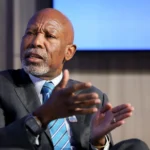NAIROBI (Elevation News) — Two of Africa’s most influential tech leaders, Strive Masiyiwa, Founder and Executive Chairman of Econet Global and Cassava Technologies, and Dr James Manyika, Senior Vice President at Google, have urged African governments, entrepreneurs, and educators to move decisively in shaping the continent’s artificial intelligence (AI) future.
Speaking at a high-level dialogue titled “Africa’s AI Path: Lessons, Progress and What Lies Ahead,” Masiyiwa and Manyika revisited a ground-breaking 2023 conversation that explored Africa’s role in the global AI revolution. Two years later, their message was even more urgent, Africa cannot afford to be a passive user of AI; it must become an active innovator, creator, and leader.
Masiyiwa, one of Africa’s most renowned entrepreneurs, opened with a clear challenge to business and policy leaders: “If you’re running a business, a school, or even a non-profit, and you’re not using AI, step out for five minutes, download Gemini, and start learning,” he said, referring to Google’s AI platform.
He praised the rise of young African developers who are already building applications in local languages such as Swahili, Zulu, and Yoruba, calling them the true pioneers of Africa’s digital transformation.
“Ten years from now, the wealthiest Africans won’t be the Dangotes and Masiyiwas,” he predicted. “They’ll be young people sitting in their bedrooms, building AI applications for agriculture, health, and food security.”
Dr Manyika, who leads Google’s global technology and society division, outlined how access to AI tools has expanded dramatically since their first discussion in 2023. “We’re giving free access to students over the age of 18 in eight countries,” he said. “That’s over half a billion Africans who can start learning, innovating, and creating with AI.”
He highlighted Google’s growing investments in Africa, from undersea cables and cloud infrastructure to AI research hubs in Ghana and Kenya, where African teams are working on world-leading projects in language modelling, weather forecasting, and agricultural intelligence.
“Our teams in Africa are not just applying AI, they’re advancing it,” said Manyika. “From plant phenotyping for food security to open building datasets that support disaster response, African innovations are contributing to global solutions.”
Masiyiwa shared examples of how Cassava Technologies is already deploying AI to solve African challenges.
In partnership with Google Cloud, the company is rolling out distributed cloud infrastructure to support governments and institutions in education, healthcare, and agriculture. One of its latest tools allows smallholder farmers to diagnose crop diseases or pest infestations instantly by simply taking a photo of a leaf. “In seconds, AI can tell a farmer what the problem is and alert government systems to respond,” Masiyiwa explained. “These are not abstract concepts; they’re tools we are deploying right now.”
He also spoke about the transformative power of AI-guided learning, which can personalise education in multiple African languages. “Imagine a teacher in a rural village who can now use AI to teach Newton’s laws of gravity in their local language,” he said. “That’s how we bridge the education divide.”
Both leaders acknowledged the ethical and governance challenges surrounding AI. Masiyiwa revealed that he and Manyika were heading to the Vatican in the coming weeks for discussions on the ethics and safety of AI, a topic they’ve previously engaged with global thought leaders on. “We must not rush to regulate what we don’t understand,” Masiyiwa cautioned policymakers. “First, learn how AI works. Play with it. Experiment with it. Then regulate wisely.”
Manyika echoed the sentiment, stressing the need for balanced AI governance that promotes innovation while protecting public interest. “Africa must ensure its data, languages, and cultures are represented in the models shaping the future,” he said. “That means building local datasets, supporting homegrown research, and empowering entrepreneurs.”
Looking to the future, both visionaries envision an Africa where AI drives productivity, transparency, and opportunity. They expect governments to use AI to streamline public services, from passport systems to health records, while entrepreneurs create new markets and value chains.
“Two years from now, I want us to be talking about real AI case studies in African businesses,” said Masiyiwa. “We should be seeing venture capitalists walking the corridors of African innovation hubs because they’ve heard about what’s being built here.”
Manyika agreed, adding that by 2027, he hopes to see multiple African AI unicorns, startups valued at over $1 billion, emerge across the continent. “We don’t just need Africans using AI; we need Africans building it,” he said. “The next global breakthroughs should come from Nairobi, Accra, or Lagos, not just Silicon Valley.”
Their conversation closed with a reminder that Africa’s future in artificial intelligence depends not only on access to technology but on vision, collaboration, and bold leadership. Masiyiwa summed it up best, “AI is not rocket science. It’s a tool. The question is whether we’ll use it to solve Africa’s problems, or wait for others to do it for us.”
As the audience applauded, it was clear that this was more than a dialogue, it was a call to action.
The AI revolution is underway, and Africa, guided by its brightest minds, is finally stepping forward to shape its own digital destiny.









